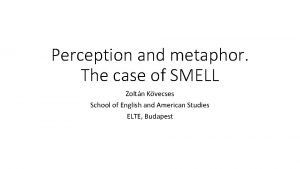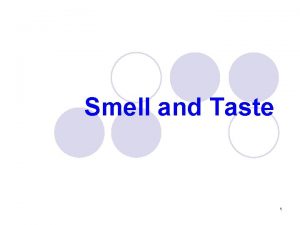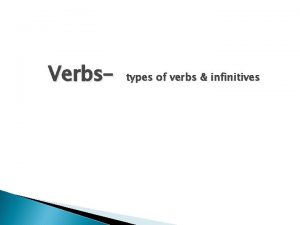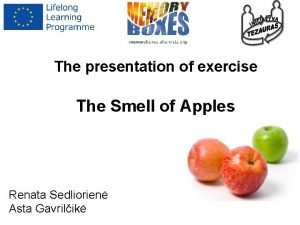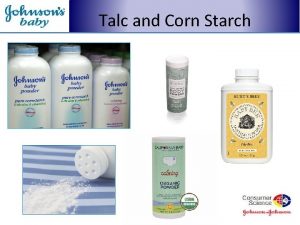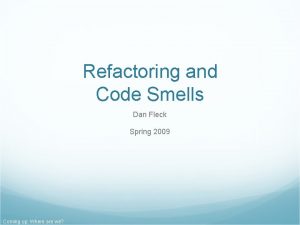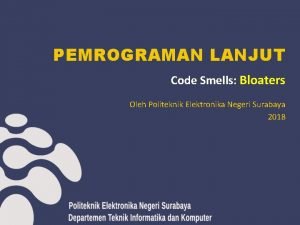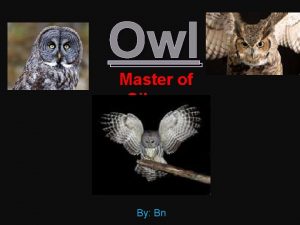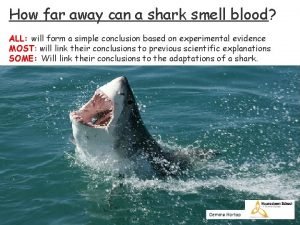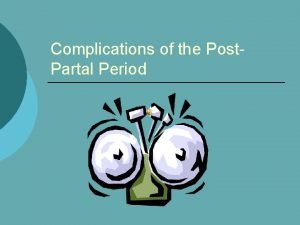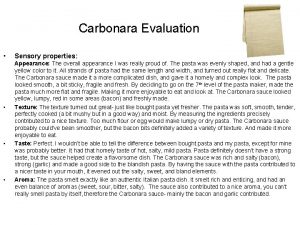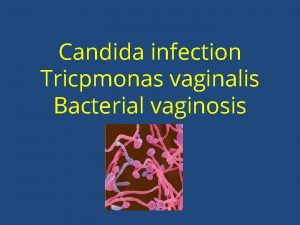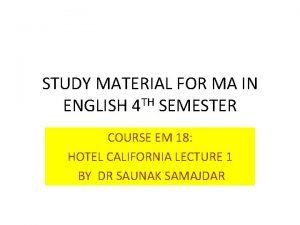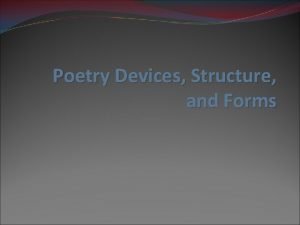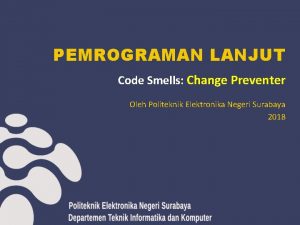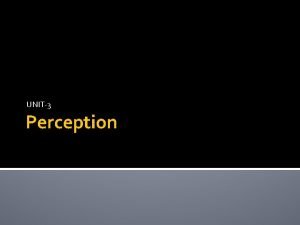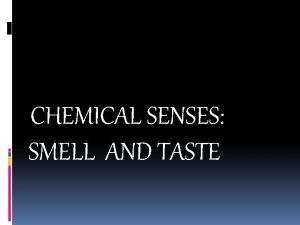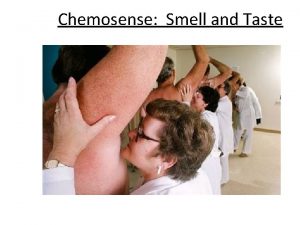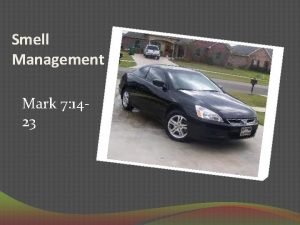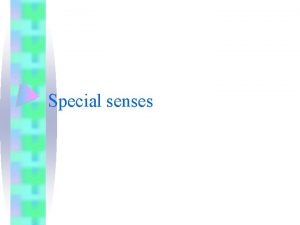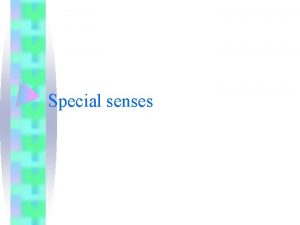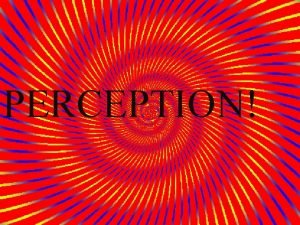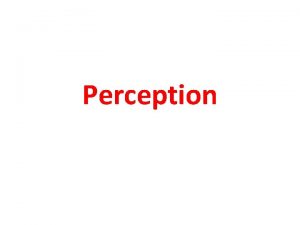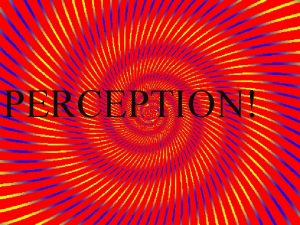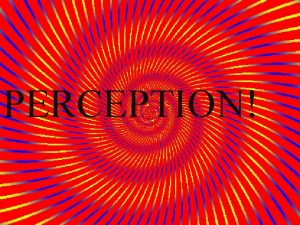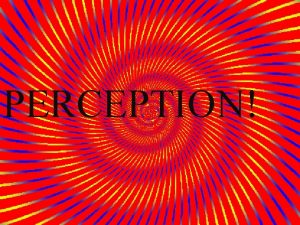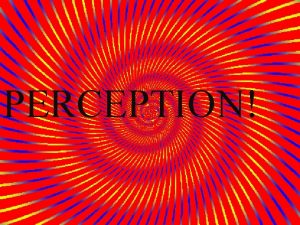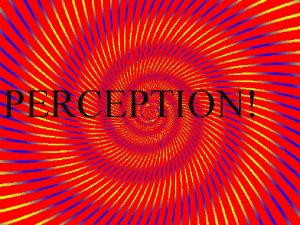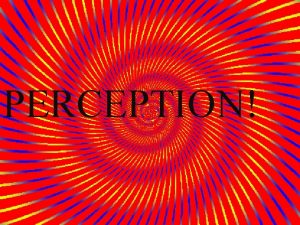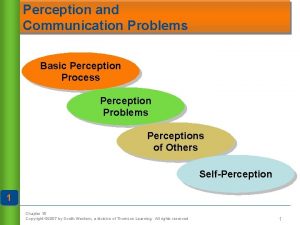Perception and metaphor The case of SMELL Zoltn





![• Senses of the verb: 1. (14){02129213} <verb. perception>[39] S: (v) smell#1 (smell%2: • Senses of the verb: 1. (14){02129213} <verb. perception>[39] S: (v) smell#1 (smell%2:](https://slidetodoc.com/presentation_image/f3fbb457303ebc0784639cf518b96b24/image-6.jpg)



















- Slides: 25

Perception and metaphor. The case of SMELL Zoltán Kövecses School of English and American Studies ELTE, Budapest

Outline • Methodological comments • The lexical category of SMELL • The status of SMELL in metaphor • SMELL as a source domain • SMELL as a target domain • A comparison with EMOTION

Methodological comments • Criticism of the „intuitive” method in CMT: corpus linguistics • The lexical method • Main differences between the two methods: • Lexical approach: decontextualized conventional types in dictionaries • Corpus-ling. approach: contextualized conventional and unconventional tokens in real discourse

The lexical category of SMELL • Noun: 5 senses (1 not shown) 1. (8){05721684} <noun. cognition>[09] S: (n) smell#1 (smell%1: 09: 02: : ), odor#2 (odor%1: 09: 00: : ), odour#1 (odour%1: 09: 00: : ), olfactory sensation#1 (olfactory_sensation%1: 09: 00: : ), olfactory perception#1 (olfactory_perception%1: 09: 00: : ) (the sensation that results when olfactory receptors in the nose are stimulated by particular chemicals in gaseous form) "she loved the smell of roses" 2. (5){04987257} <noun. attribute>[07] S: (n) olfactory property#1 (olfactory_property%1: 07: 00: : ), smell#2 (smell%1: 07: 00: : ), aroma#1 (aroma%1: 07: 00: : ), odor#1 (odor%1: 07: 00: : ), odour#2 (odour%1: 07: 00: : ), scent#3 (scent%1: 07: 00: : ) (any property detected by the olfactory system) 3. {05666448} <noun. cognition>[09] S: (n) smell#4 (smell%1: 09: 01: : ), sense of smell#1 (sense_of_smell%1: 09: 00: : ), olfaction#1 (olfaction%1: 09: 00: : ), olfactory modality#1 (olfactory_modality%1: 09: 00: : ) (the faculty that enables us to distinguish scents) 4. {00884639} <noun. act>[04] S: (n) smell#5 (smell%1: 04: 00: : ), smelling#1 (smelling%1: 04: 00: : ) (the act of perceiving the odor of something)

• Senses of noun: 1. (the sensation that results when olfactory receptors in the nose are stimulated by particular chemicals in gaseous form) "she loved the smell of roses" 2. (any property detected by the olfactory system) 3. (the faculty that enables us to distinguish scents) 4. (the act of perceiving the odor of something)
![Senses of the verb 1 1402129213 verb perception39 S v smell1 smell2 • Senses of the verb: 1. (14){02129213} <verb. perception>[39] S: (v) smell#1 (smell%2:](https://slidetodoc.com/presentation_image/f3fbb457303ebc0784639cf518b96b24/image-6.jpg)
• Senses of the verb: 1. (14){02129213} <verb. perception>[39] S: (v) smell#1 (smell%2: 39: 01: : ) (inhale the odor of; perceive by the olfactory sense) 2. (12){02128137} <verb. perception>[39] S: (v) smell#2 (smell%2: 39: 00: : ) (emit an odor) "The soup smells good„ 3. (3){02128797} <verb. perception>[39] S: (v) smell#3 (smell%2: 39: 02: : ) (smell bad) "He rarely washes, and he smells"

• Frame elements for SMELL 1 (passive): • • origin of smell • cause of smell • produce/emit smell • the smell itself • organism (with the faculty of smell) as patient/experiencer • faculty of smell • perceive smell

• Passive version: • • origin/cause of smell – emits smell – organism with the faculty of smell (experiencer) – perceives the smell

• Frame elements for SMELL 2 (active): • an object as source of smell • the smell as a property of object • object has smell as a property • an agent with the faculty of smell • agent performs action of smelling • agent perceives the smell

• Active version: • object has property of smell – agent (with faculty of smell) performs act of smelling – agent perceives smell

The status of SMELL in metaphor • Smell as a source domain • Smell as both source and target: sweet music, loud tie, sweet smell • Smell as a target domain

Smell as a source domain • SUSPECTING IS SMELLING • BAD IS SMELLY • THE GENERAL ATMOSPHERE OF SG (SITUATION or EVENT) IS AN (OLFACTORY) PERCEPTION: smell: "it had the smell of treason" "his speeches smacked of racism"; "this passage smells of plagiarism„ • BECOMING INSTINCTIVELY AWARE OF SG IS SMELLING SG: sense sg, smell sg, smell out sg

Perception in general as a source domain • THE GENERAL ATMOSPHERE OF SG IS AN (OLFACTORY) PERCEPTION: smell: "I sense his hostility"; "it had the smell of treason" "I smell trouble"; "smell out corruption" • THE GENERAL ATMOSPHERE OF SG IS AN (SPIRITUAL? ? ) PERCEPTION: spirit: “the spirit of the times” • THE GENERAL ATMOSPHERE OF SG IS AN (AUDITORY) PERCEPTION: tone: "a clergyman improved the tone of the meeting"; • THE GENERAL ATMOSPHERE OF SG IS AN (TACTILE) PERCEPTION: feel, feeling: "the feel of the city excited him"; • THE GENERAL ATMOSPHERE OF SG IS AN (GUSTATORY) PERCEPTION: flavor: “her performance adds flavor to the show” “the conversation left a bad taste in my mouth” • THE GENERAL ATMOSPHERE OF SG IS A (VISUAL) PERCEPTION: look: “I don’t like the looks of this”

Smell as both source and target „the sweet smell of success” • (informal) the pleasant feeling of being successful • PLEASANT IS SWEET; TASTE FOR SMELL; PERCEPTION FOR EMOTION • PLEASANT IS SWEET; EMOTION IS PERCEPTION

Smell as a target domain: FRAMES • Active frame: inhale the odor of Literal sense ? • Passive frame: emit an odor • THE CAUSE OF SMELL IS A CONTAINER • THE SMELL IS A SUBSTANCE INSIDE THE CONTAINER • FOR THE SMELL TO BECOME PERCEIVABLE IS FOR THE SUBSTANCE TO COME OUT OF THE CONTAINER

Smell as a target domain: EXISTENCE • VERB + SMELL be filled with, have The air was filled with a pervasive smell of chemicals. The cottage had a musty smell after being shut up over the winter. | give off The skunk gives off an unpleasant smell when attacked. | catch, detect As she walked into the house she detected the smell of gas. • be filled with: PERCEPTIONS ARE SUBSTANCES – SMELL IS A SUBSTANCE / STATES ARE CONTAINERS – EXISTENCE OF SMELL IN A LOCATION IS A SUBSTANCE IN A CONTAINER • have: EXISTENCE IS POSSESSION – EXISTENCE OF SMELL IS POSSESSING AN OBJECT

EXISTENCE • give off: CAUSATION IS TRANSFER – CAUSING SMELL TO COME INTO EXISTENCE IS TRANSFER OF AN OBJECT: give • SOURCE (OF SMELL) IS A SURFACE (FROM WHICH AN OBJECT MOVES): off • catch: COMING INTO EXISTENCE IS COMING INTO POSSESSION – SENSING A SMELL IS COMING INTO POSSESSION OF A MOVING ENTITY

EXISTENCE • PREP. ~ from the putrid smell from the slaughterhouse | ~ of The faint smell of her perfume hung in the air. • PREP. like It smells like rotten meat! | of The kitchen smelled sweetly of herbs and fruit. • SOURCE OF SMELL: kitchen, CAUSE OF SMELL: of herbs and fruit • SOURCE OF SMELL: from, CAUSE OF SMELL: of

EXISTENCE • SMELL + VERB come, emanate, drift, float, waft A delicious smell of freshly baked bread wafted across the garden. | fill sth, hang | hit sb Then the pungent smell hit us? rotting fish and seaweed. • come, emanate, drift, float, waft: EVENTS ARE MOVEMENTS – THE OCCURRENCE OF SMELL IS MOVEMENT OF AN ENTITY

INTENSITY • ADJ. overpowering, pervasive, pungent, rich, sharp, strong There was an overpowering smell of burning tyres. | faint | distinctive, particular, unmistakable | funny, peculiar, strange, unusual What's that funny smell? | familiar | lingering | aromatic, delectable, delicious, fragrant, fresh, lovely, nice, savoury, sweet, wonderful the aromatic smells of a spring garden full of herbs | warm | appalling, awful, bad, evil, horrible, nasty, offensive, terrible, unpleasant, vile | acrid, nauseating, putrid, rank, sickly An acrid smell filled the air. | damp, dank, musty, rancid, sour, stale the sour smell of unwashed linen | earthy, fishy, masculine, metallic, musky, oily, smoky, spicy | cooking Cooking smells drifted up from the kitchen.

INTENSITY • overpowering, strong, faint, pungent? : INTENSITY IS STRENGTH – INTENSITY OF SMELL IS STRENGTH OF EFFECT • sharp: INTENSITY IS SHARPNESS ? • faintly, vaguely: INTENSITY OF SMELL IS INTENSITY OF LIGHT ? • pervasive, fill: INTENSITY OF SMELL IS QUANTITY

LACK OF CONTROL hit: • CAUSES ARE FORCES – SMELL IS A PHYSICAL FORCE • INTENSE SMELL IS A STRONG PHYSICAL FORCE/OBJECT • SENSING AN INTENSE SMELL IS COMING INTO CONTACT WITH A STRONG PHYSICAL OBJECT • THE EXPERIENCER OF AN INTENSE SMELL IS A PERSON COMING INTO ABRUPT PHYSICAL CONTACT WITH A STRONG PHYSICAL OBJECT lack of control

A COMPARISON WITH EMOTIONS • Prototypical emotions: • CAUSE (OF EMOTION) – CAUSES – EMOTION– CONTROL – ACTION • | • EFFECT OF EMOTION

A COMPARISON WITH EMOTIONS • Non-prototypical emotions: • CAUSE (OF SURPRISE) – CAUSES – SURPRISE – LOSS OF CONTROL • | • EFFECTS OF SURPRISE

CONCLUSIONS • 1. The study of SMELL in English. • 2. The study of how the conceptual system is structured. • 3. The study of SMELL vis-a-vis other domains. • 4. The study of conceptual metaphors.
 Cellulz
Cellulz Smell
Smell Best case worst case average case
Best case worst case average case The chemical senses taste and smell review worksheet
The chemical senses taste and smell review worksheet Sight hearing taste smell and touch
Sight hearing taste smell and touch Flow chart of taste and smell
Flow chart of taste and smell Linking verb
Linking verb Picture an apple in your mind
Picture an apple in your mind Replacement for cornstarch
Replacement for cornstarch Code smell
Code smell Bloaters code smell
Bloaters code smell Physical features of owl
Physical features of owl Once upon a time there was a boy who dreamed
Once upon a time there was a boy who dreamed How many miles away can a shark smell blood
How many miles away can a shark smell blood Site:slidetodoc.com
Site:slidetodoc.com Carbonara food poisoning
Carbonara food poisoning Mobiluncus
Mobiluncus Esters from carboxylic acids
Esters from carboxylic acids Melena smell
Melena smell Rubin's stages of maternal adaptation
Rubin's stages of maternal adaptation Colitas hotel california meaning
Colitas hotel california meaning Connotation of smell
Connotation of smell Descriptive language in poetry
Descriptive language in poetry Is smell a physical property
Is smell a physical property Divergent change code smell
Divergent change code smell Simple past tense throw
Simple past tense throw

